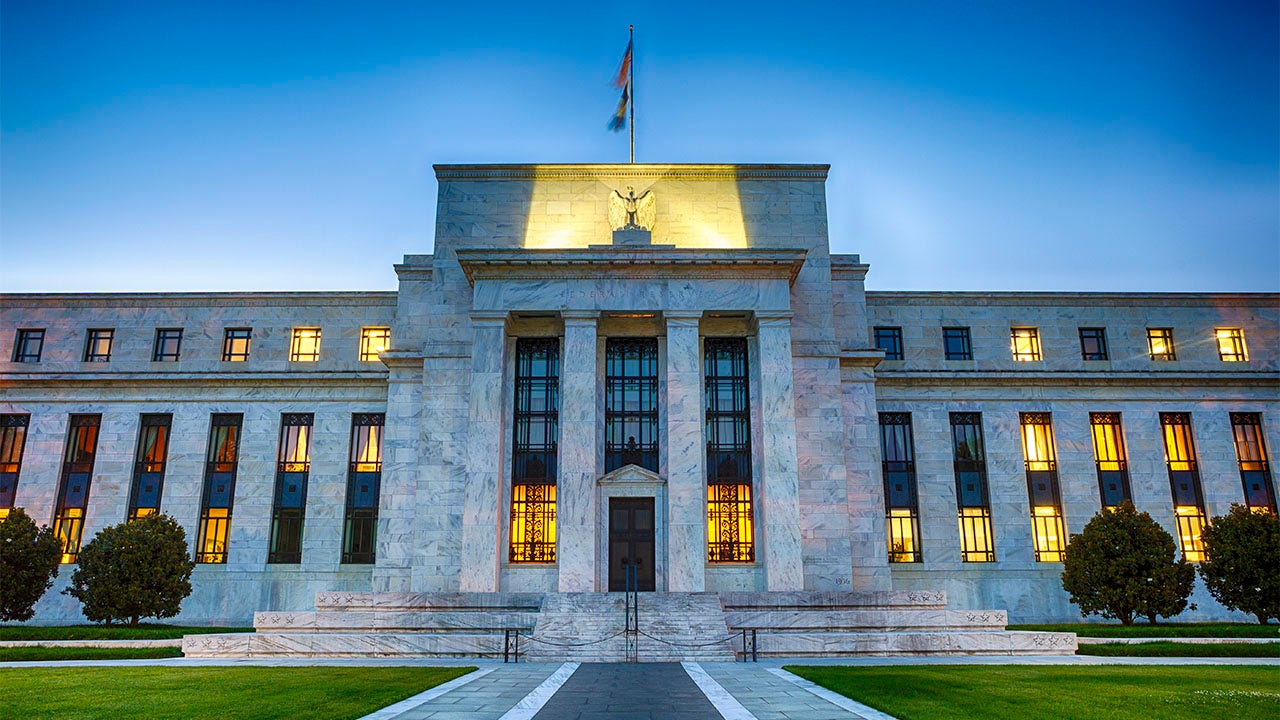
Sen. Ron Johnson, R-Wis., argues Democrats 'take credit for a good economy,' but 'won't take the blame when their tax increases do long term harm.'
The National Association for Business Economics' (NABE) March 2020 Economic Policy survey finds that almost half of respondents believe the Federal Reserve could tighten its monetary policy by the end of 2022. The survey, conducted between Feb. 22 and March 5, is a summary of the responses of NABE's 205 members.
FED TELLS BANKS RELAXED COVID CAPITAL RULES ENDING
The Federal Reserve has been targeting a range of 0.0%-0.25% for the federal funds rate since March 15, 2020. The overwhelming majority of survey respondents (88%) expect the next move in the fed funds target rate will be a rate hike, while 3% anticipate the next move will be a rate cut—implying the Fed would aim for a negative federal funds rate.
About 46% of NABE members surveyed believe the Federal Reserve will raise the fed funds target in 2022, while 12% say later this year. Approximately 28% believe interest rates will be raised in 2023 and 12% believe the rate hike will come after 2023.
About 72% of respondents expect the upper end of the fed funds target rate range to remain at 0.25%, or even drop lower, through year-end 2021. Only 3% of respondents expect the top of the Fed’s target band to be at 0.75% or higher by year-end 2021, while 47% of members expect a target level of 0.75% or higher by the end of 2022. Nearly a third of survey respondents (30%) looks for an upper target of 0.25% or less to persist through 2022.
Nearly three-quarters of NABE survey respondents, or 72%, believe that the current stance of U.S. monetary policy is “about right.” About one in four respondents (26%) view current Fed policy as “too stimulative,” compared to the 20% who held this view in the August survey, while 2% indicate it is “too restrictive.”
GET FOX BUSINESS ON THE GO BY CLICKING HERE
When it comes to fiscal policy, 41% of survey respondents find current fiscal policy is “about right,” up modestly from the 37% who held this view in the August 2020 survey. Thirty-four percent of respondents indicate that current policy is too stimulative, up from 17% last August. About 25% of respondents believe that current policy is too restrictive, down from 45% in the previous survey.
Roughly a third of respondents (38%) believe the primary objective of current fiscal policy should be to stimulate more robust economic growth in the medium-to-long term, while another 31% believe the primary goal should be to stimulate growth as quickly as possible.
About 8% of respondents believe current fiscal policy should focus primarily on addressing income inequality, while 7% believe reducing the deficit and debt should be the primary focus. About 64% of respondents favor enacting structural policies to support stronger economic growth, while more than one-third each favors increasing tax revenues (38%) and exercising greater spending restraint (37%). Sixteen percent believe other action should be taken, while 8% believe no policy changes should be made.
The majority of respondents (67%) believe coordination between fiscal and monetary policy is desirable, compared to 27% who say it would not be.
CLICK HERE TO READ MORE ON FOX BUSINESS
As for the evaluation of Congress' fiscal response to the pandemic, 37% of respondents rate the response as insufficient, slightly lower than the 40% in NABE's August 2020 survey, while 33% rate the response as adequate also down slightly from 37% in the previous survey.About 18% of respondents believe Congress' fiscal response is excessive, up from 11% in the August survey. It should be noted that the survey was conducted while the American Rescue Plan was under consideration in Congress and that all responses were submitted before the legislation was signed into law.
Survey respondents differ when it comes to the optimal way for Congress to increase revenues. Approximately 55% of respondents favor a broad-based energy or carbon tax (the same share as in the August survey), while 36% support increasing corporate tax rates. Almost a third of respondents (29%) favors increasing Social Security and/or Medicare contributions. Nearly the same share of respondents support enacting a wealth tax (27%) or increasing individual income tax rates (25%).
Respondents are also divided on what the Biden administration's top three policy priorities for its first year in office should be. Almost half of panelists (46%) consider combating COVID-19 a top priority, followed by 40% who cite promoting economic recovery. About 38% percent of respondents suggest infrastructure investment is a top priority, a significant spike compared to no respondents rating it among their top three priorities in the August survey. The next most frequently cited significant issues are addressing climate change (30%), health care policy (25%), and immigration (22%).
"may" - Google News
March 22, 2021 at 11:01AM
https://ift.tt/391hNRC
Fed may hike rates sooner than 2023: NABE - Fox Business
"may" - Google News
https://ift.tt/3foH8qu
https://ift.tt/2zNW3tO
Bagikan Berita Ini














0 Response to "Fed may hike rates sooner than 2023: NABE - Fox Business"
Post a Comment